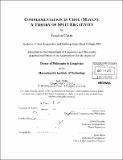Complementation in Chol (Mayan) : a theory of split ergativity :
Author(s)
Coon, Jessica
DownloadFull printable version (15.67Mb)
Other Contributors
Massachusetts Institute of Technology. Dept. of Linguistics and Philosophy.
Advisor
David Pesetsky.
Terms of use
Metadata
Show full item recordAbstract
The central claim of this dissertation is that aspect-based split ergativity does not mark a split in how Case is assigned, but rather, a split in sentence structure. Specifically, I argue that the contexts in which we find the appearance of a nonergative pattern in an otherwise ergative language-namely, the nonperfective aspects-involve an intransitive aspectual matrix verb and a subordinated lexical verb. In other words, the nonperfective forms show a dissociation between the syntactic predicate and the stem carrying the lexical verb stem. This proposal builds on the proposal of Basque split ergativity in Laka 2006, and extends it to other languages. I begin with an analysis of split person marking patterns in Chol, a Mayan language of southern Mexico. I argue that the appearance of split ergativity in the language follows naturally from the fact that the progressive and the imperfective morphemes are verbs, while the perfective morpheme is not. Ergative-patterning perfective constructions are thus monoclausal, while progressives and imperfectives involve an aspectual matrix verb and a nominalized embedded clause. The fact that the nonperfective morphemes are verbs, combined with independent properties of Chol grammar, results in the appearance of a split. Next, focusing on Chol, I survey aspect splits in a variety of unrelated languages and offer an explanation for the following universal: in a language with an aspectual split, the perfective aspect will always retain an ergative pattern (Dixon 1979). Following Laka's (2006) proposal for Basque, I suggest that the cross-linguistic tendency for imperfective aspects to pattern with locative constructions is responsible for the biclausality which causes the appearance of a nonergative pattern. Building on Demirdache and Uribe-Etxebarria's (2000) prepositional account of spatiotemporal relations, I propose that the perfective is never periphrastic (and thus never involves a split) because there is no preposition in natural language that correctly captures the relation of the assertion time to the event time denoted by the perfective aspect; instead, perfective is the default aspect. The proposal here thus accounts both for the appearance of aspect-based split ergativity without the need for special rules of Case assignment, and also provides an explanation for why we find the splits in certain aspects and not others.
Description
Thesis (Ph. D.)--Massachusetts Institute of Technology, Dept. of Linguistics and Philosophy, 2010. Cataloged from PDF version of thesis. Includes bibliographical references (p. 251-264).
Date issued
2010Department
Massachusetts Institute of Technology. Department of Linguistics and PhilosophyPublisher
Massachusetts Institute of Technology
Keywords
Linguistics and Philosophy.